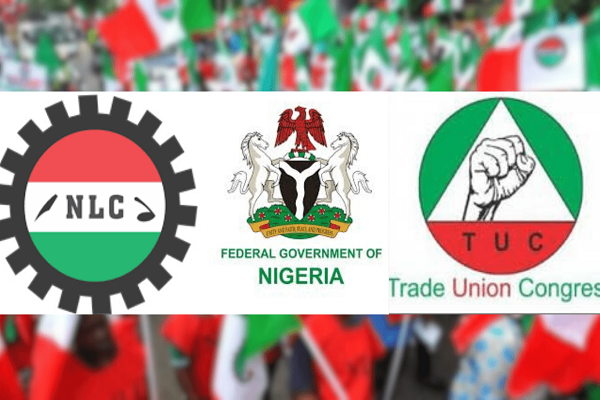The Federal Government will spend not less than N2 trillion directly on the implementation of the Monday’s pact with the organised labour.
After a 4-hour meeting, an agreement was reached to cushion the petrol subsidy removal pains on federal workers and other categories of Nigerians.
Highlights of the Memorandum of Understanding (MoU) signed by government and labour are as follows:
•Payment of a wage award of N35,000 monthly to federal workers for six months;
•Allocation of N100 billion for high-capacity Compressed Natural Gas (CNG) buses;
•55,000 CNG conversion kits and CNG stations nationwide; and
•N75,000 grant to 15 million households, payable in N25,000 monthly for three months.
Government will require N1.125 trillion to actualise the N75,000 grant to 15 million households for three months. The money will lift the living standard of some of the poorest Nigerians as well as pensioners.
The monthly wage award of N35,000 for about 1.5 million federal workers will cost the government N315 billion over a six-month period.
Besides, N100 billion will be committed to high-capacity CNG buses for deployment and use of commuters.
A review of the expenditure plan for 55,000 CNG conversion kits and construction of 84 units of CNG stations nationwide shows that about N400 billion will be invested.
The estimation is that government will construct two CNG stations per state and the FCT, with 10 additional stations spread across major economic centres.
Experts, social advocates and other stakeholders yesterday hailed the agreement and suspension of the strike, noting that the commitments to tangible palliatives will directly boost the economy.
They agreed that the suspension of the strike would save the economy huge losses. The strike was estimated to cost the economy not less than N50 billion per day.
The House of Representatives said the decision to suspend the strike was in the best interest of the country.
Deputy Speaker Benjamin Kalu said if organised Labour had embarked on strike, the economy would have been given a rude shock, adding that dialogue between the government and Labour yielded a positive result.
He also commended the Federal Government for budgeting N100 billion for the procurement of CNG powered buses and CNG kits to kick start the conversion.
Kalu expressed confidence in the ability of President Bola Ahmed Tinubu to engage the productive sector to drive the economic recovery process.
According to him, the third quarter micro-economic report showed that oil production moved from 1.2 million barrel per day to 1.45 million barrel per day.
He said though there was an improvement, more still needed to be done while there is need to work in synergy to optimise oil production.
The Nigeria Employers Consultative Association (NECA) said the country was able to avert unnecessary disruption.
Its Director-General, Mr Adewale-Smatt Oyerinde, said there is need for government to fulfill the terms of the resolution, urging the organised labour to also ensure improved productivity to get the wheel of production going.
“Employers will continue to insist on, and advocate a peaceful industrial environment as a pillar for economic and national renaissance,” Oyerinde said.
The NECA DG added that the effects of strike on the private sector were unimaginable.
